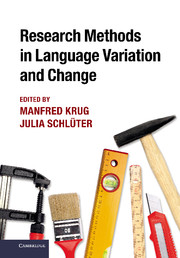17 - Applying typological methods in dialectology
Published online by Cambridge University Press: 05 June 2014
Summary
Introduction
Since the end of the 1990s, we have been calling for an integration of typological methods and insights into dialectological enterprises (e.g. Kortmann 1999; Anderwald and Kortmann 2002; Kortmann 2003, 2004). This new perspective informed among other things the Freiburg project on ‘English Dialect Syntax from a Typological Perspective’ (2000 to 2005), in which we aimed to explore morphosyntactic variation across the dialects of England in the light of results, methods and approaches from cross-linguistic variation. Besides the compilation of FRED (the Freiburg English Dialect Corpus, cf. Anderwald and Wagner 2007), this project has resulted in the publication of a number of (both qualitative and quantitative) corpus- (largely FRED-) based studies of individual morpho-syntactic phenomena (e.g. Anderwald 2002, 2009; Kortmann et al. 2005; Pietsch 2005; Hernandez, Kolbe and Schulz 2011). The present chapter contributes to the enterprise of accounting for linguistic variation in a unified way, along the lines of Croft’s (1990/2003) ‘integrative functionalism’ and Bisang’s call for an integration of typology, dialectology and contact linguistics (2004). It is also related to Chambers’ proposal of vernacular universals (2009, 2004) which has triggered a lively debate among dialectologists, variationists, and typologists in recent years (cf. Filppula, Klemola and Paulasto 2009; Kortmann and Szmrecsanyi 2011). Since our first proposals along these lines, other researchers have also started to take into account findings from typology (cf. e.g. Nevalainen, Klemola and Laitinen 2006; Trousdale and Adger (eds.) 2007; Siemund 2008, 2011; Dufter, Fleischer and Seiler 2009), and typological asides figure increasingly in studies of intra-language variation.
Information
- Type
- Chapter
- Information
- Research Methods in Language Variation and Change , pp. 313 - 334Publisher: Cambridge University PressPrint publication year: 2013
References
Accessibility standard: Unknown
Why this information is here
This section outlines the accessibility features of this content - including support for screen readers, full keyboard navigation and high-contrast display options. This may not be relevant for you.Accessibility Information
- 4
- Cited by
